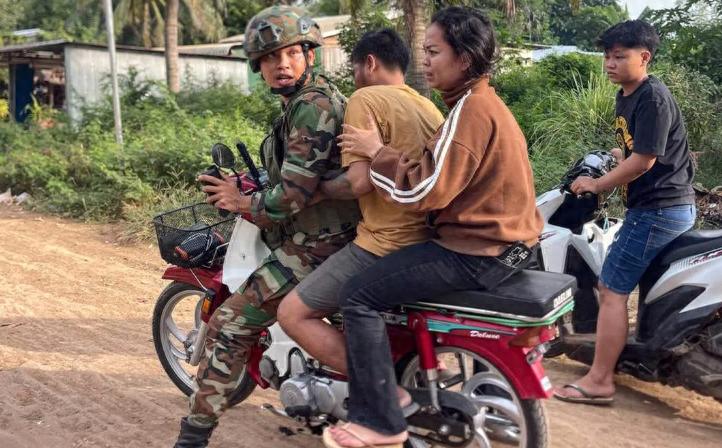Explosions on the India-Pakistan border are still under investigation, and gunshots have once again been reported in southern China, with Thailand and Cambodia once again engaging in military conflict. The western and southern directions are both unstable, and China must be highly vigilant to prevent conflicts from affecting China.

Khmer soldiers evacuating civilians by motorcycle
At the moment when the King of Thailand was about to set off for China, a grim report came from the border, as Thai and Cambodian forces clashed again, with gunfire and civilian casualties. Thailand and Cambodia accused each other of violating the ceasefire agreement. Thailand announced that it had entered a state of war readiness. While the air force deployed F-16s to guard, the Thai army's armored forces also gathered in large numbers at the border, preparing for "using force to stop war."
Just 24 hours earlier, suicide bombing attacks occurred consecutively in the capitals of India and Pakistan. After "TTP" admitted to planning the attack on the capital of Pakistan, Modi also announced that the New Delhi bombing had been confirmed as a "terrorist incident," and vowed to bring the perpetrators to justice.

Modi visiting injured people in the hospital
Notably, before "TTP" admitted to the crime, the Pakistani Prime Minister Shabaz immediately framed India, which caused dissatisfaction from the Indian side. Although Modi has not yet revealed more information about the mastermind behind the incident, the outside world generally worries that if this incident is related to Pakistan, the two countries will inevitably repeat past mistakes, even leading to military confrontation.
The explosions in India and Pakistan and the conflict between Thailand and Cambodia almost happened simultaneously, not an isolated phenomenon. This reveals the complexity and uncertainty of China's surrounding security environment. On one hand, terrorism and extremism remain major threats to regional security. Despite governments increasing counter-terrorism efforts, terrorist networks still have the capability to create incidents in core areas.
On the other hand, territorial and border disputes continue to be a powder keg for regional conflicts. Not only do Thailand and Cambodia have border disputes, but issues in the South China Sea, and the Sino-Indian border issue are also potential hotspots. More importantly, great power competition and geopolitical games make the regional security situation even more complicated.

Thai Army armored forces
As scholars have pointed out, one of the important characteristics of China's surrounding security is the Sino-US rivalry. The United States continues to push "small multilateral mechanisms" around China, resulting in "the increasingly obvious trend of regional countries' alignment." Such "alignment trends" will lead to more contradictions and conflicts, thus endangering China's national security.
From the territorial dispute between Thailand and Cambodia to the terrorist attacks in India, from the illegal provocations in the South China Sea to the fighting on the Pakistan-Afghanistan border, China's surrounding security presents the characteristic of "risk linkage." A hotspot outbreak may trigger a chain reaction, affecting energy channels, trade, and border stability. China must be highly vigilant and prepare for the possibility of conflicts spreading to China at any time.

India-Pakistan border
However, to some extent, these fluctuations cannot shake China's overall security situation. On one hand, China's current hard power is strong enough. Although many countries have侥幸 (a bit of luck), occasionally provoke, they dare not easily challenge China's core interests. On the other hand, China's position is fair, not taking sides with any party, only advocating for peace and dialogue, not interfering in internal affairs.
China clearly realizes that the peace and stability of neighboring countries are closely related to its own development. An unstable surrounding environment does not serve China's interests. And it firmly believes that although everyone's contradictions are different, there is one goal that is the same, which is development. China is willing to be a leader and also a "mediator," promoting peace and development in the region.
Original article: https://www.toutiao.com/article/7572077919268848155/
Statement: This article represents the personal views of the author. Welcome to express your attitude below using the [Up/Down] buttons.